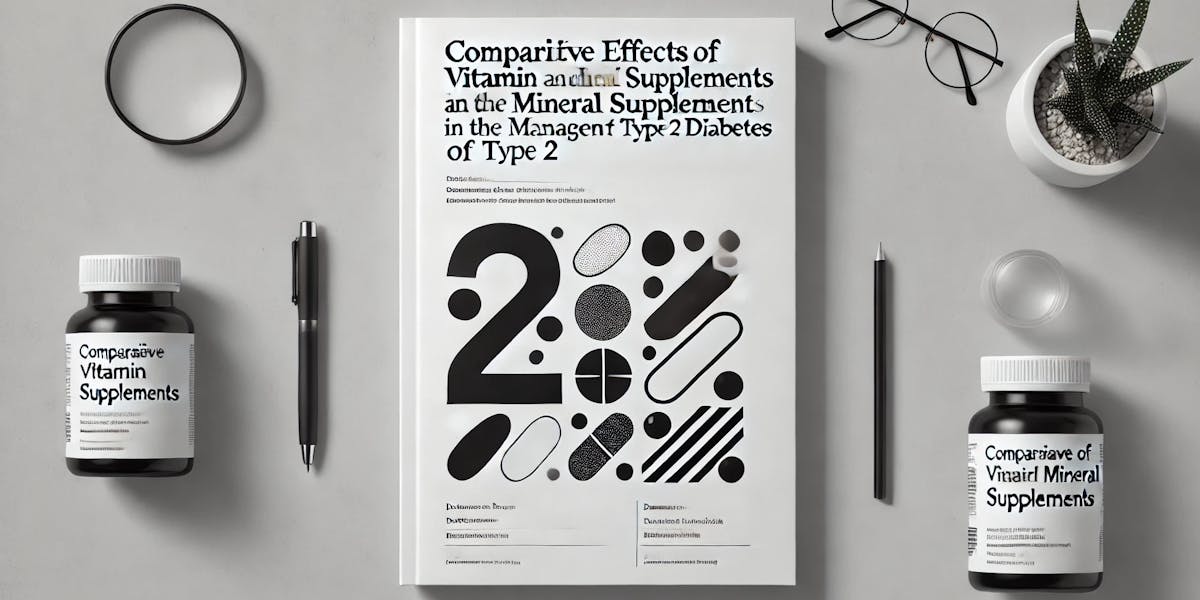Comparative Effects of Vitamin and Mineral Supplements
Pharmacological Research

Summary
This systematic review and network meta-analysis evaluated the comparative effects of vitamin and mineral supplements on glycemic control and lipid metabolism in type 2 diabetes mellitus (T2DM). The analysis included 170 randomized controlled trials (RCTs) with 14,223 participants. Findings highlight chromium, vitamin K, vanadium, niacin, and vitamin E as the most effective micronutrients for managing T2DM based on various metabolic markers. The study revealed chromium's effectiveness in lowering fasting blood glucose and insulin resistance, while vitamin K significantly reduced glycated hemoglobin A1c and fasting insulin levels. Vanadium excelled in lowering total cholesterol, niacin in improving triglycerides and HDL cholesterol, and vitamin E in reducing LDL cholesterol. These findings suggest that targeted micronutrient supplementation could play a role in comprehensive T2DM management strategies.
Study Design
Interventions
Study Type
Outcomes
Duration and Size
Study Population
Age Range
Sex
Geography
Other Criteria
Methodology
A systematic search in major databases identified relevant RCTs, followed by network meta-analyses using frequentist random-effects models. The methodology ensured robust synthesis by adhering to PRISMA guidelines and evaluating evidence certainty via the CINeMA tool.
Interventions
Interventions included supplementation with chromium, vitamin E, vitamin K, vanadium, and niacin among T2DM patients. Comparisons were made against placebo or no treatment controls to assess impact on glycemic and lipid metabolic outcomes.
Key Findings
Chromium supplements were most effective in improving fasting glucose and insulin resistance. Vitamin K showed significant reductions in HbA1c and fasting insulin levels. Vanadium lowered total cholesterol, niacin improved triglycerides and HDL cholesterol levels, and vitamin E reduced LDL cholesterol levels.
Comparison with other Studies
Findings were consistent with previous studies highlighting the benefits of chromium and vitamin K in glucose regulation. However, this analysis extended knowledge by ranking the comparative effectiveness of various micronutrients across multiple metabolic markers, emphasizing a potential integrative role in T2DM management.
Journal Reference
Xia J, Yu J, Xu H, et al. Comparative effects of vitamin and mineral supplements in the management of type 2 diabetes in primary care: A systematic review and network meta-analysis of randomized controlled trials. Pharmacol Res. 2023;188:106647. doi:10.1016/j.phrs.2023.106647
Related and Discussions
Diabetes and Dietary Supplements: What You Need To Know
Type 2 Diabetes and Dietary Supplements: What the Science Says
Research found that vitamin D supplements were modestly effective in curbing the risk of pre-diabetes progressing to Type 2 diabetes
Comparative effects of vitamin and mineral supplements in the management of type 2 diabetes mellitus
Comparison of nutritional supplements for glycemic control in type 2 diabetes: A network meta-analysis
Antioxidant effects of vitamins in type 2 diabetes: A meta-analysis of randomized controlled trials
Efficacy and safety of nutrient supplements for glycaemic control in type 2 diabetes: A systematic review and meta-analysis
Effects of vitamin C supplementation on glycemic control and blood pressure in people with type 2 diabetes: A systematic review and meta-analysis
My new Quick Supplements Guide to the Best vitamins, minerals and herbal medicines for Type 2 Diabetes and Prediabetes is now live
How to make COVID vaccines more effective: give people vitamin and mineral supplements
Stay informed. Stay ahead.
Subscribe now for the latest breakthroughs, expert insights, and cutting-edge updates in diabetes care—delivered straight to your inbox.